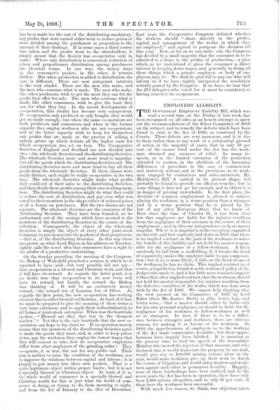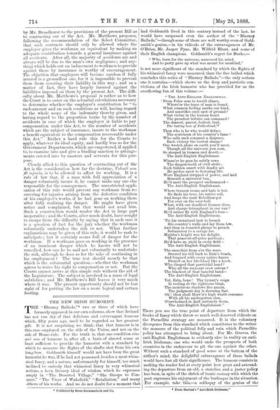EMPLOYERS' LIABILITY. T HE Government Employers' Liability Bill, which was read
a second time on the Friday of last week, has been recognised on all sides as an honest attempt to carry out the recommendations of the Select Committee of 1881; on the subject, and to remedy the defects which have been. found to exist in the Act of 1880, as construed by the Courts. Those defects are very numerous, and it is due to them rather than to any want of a substantial ground of action in the majority of cases, that in only 38 per cent. of the causes tried under the Act has the work- man obtained any measure of relief. In many re- spects, as in the limited extension of the protection extended to seamen, in the abolition of the harassing differences of procedure in the case of common-law and statutory actions, and in the provisions as to work- men engaged by contractors and sub-contractors, Mr.
Matthews's Bill, if carried in its present shape, will probably be found to provide an efficient remedy ; but in some things it does not go far enough, and in others it is in danger of proving unworkable. In the first place, the doctrine of common employment is allowed to subsist, placing the workman in a worse position than a stranger, and in a worse position than he is placed by the law of any other European State that we know of.. Ever since the time of Charles II., it has been clear law that employers are liable for the injuries resulting from the negligence of their servants in the course of their employment ; and in this our jurisprudence is by no means singular. Where it is singular is in the exception, engrafted on this rule and first explicitly laid down in 1837, that there is an implied contract on the part of the workman to waive the benefit of this liability and not hold his master respon- sible for the negligence of a fellow-workman. A brick carelessly let fall from a scaffolding, if it breaks the head_ of a passer-by, makes the employer liable to pay compensa- tion ; but if, as is more likely, it falls on the head of one of the workmen, he has no claim. This implied contract is, of course, a legal fiction, founded on the notions of policy of the Judges who made it; and it has little more reason to support it than that other implied contract, that the workman should not hold his master responsible for injuries resulting from the defective condition of his works, which was done away with by the Act of 1880. We cannot help thinking that the view pressed on the Committee of 1877 by Lord Esher (then Mr. Justice Brett) is alike better logic and better sense,—that a master should either be liable only for his own personal negligence, or should be liable for the negligence of his workmen to fellow-workmen as well as to strangers. In fact, if there is to be a differ- ence between strangers and workmen, there are obvious reasons for making it in favour of the workmen. In 1880, the apprehensions of employers as to the working of the Act made compromise desirable ; but those appre- hensions have happily been falsified. It is amusing at the present time to read the speech of the honourable. Member who moved the rejection of that measure, and who declared that it would depreciate his property by one-half, would give rise to 100,000 mining actions alone in the year, would make workmen give up their work to watch the course of litigation, and would array masters and work- men against each other in permanent hostility. Happily, none of these forebodings have been realised, and in the seven years the Act has been in operation, there have only been 1,800 actions altogether, and in only 38 per cent. of these have the workmen been successful.
With much less reason, we think, was objection taken by Mr. Broadhurst to the provisions of the present Bill as to contracting out of the Act. Mr. Matthews proposes, following the recommendation of the Select Committee, that such contracts should only be allowed where the employer gives the workman an equivalent by making an adequate contribution towards a general insurance against all accidents. After all, the majority of accidents are and always will be due to the man's own negligence ; and any- thing which holds out an inducement to workmen to provide against these by insurance is worthy of encouragement. The objection that employers will become careless if fully insured is a groundless one, for it is impossible to prevent them from covering their liability in this way ; and as a matter of fact, they have largely insured against the liabilities imposed on them by the present Act. The diffi- culty about Mr. Matthews's proposal is rather as to how the Court is to enter on the actuarial calculations necessary to determine whether the employer's contribution be " to such amount and on such conditions as will, having regard to the whole scope of the indemnity thereby given, and having regard to the proportion borne by the number of accidents in case of which the employer is liable to pay compensation under this Act, to the number of accidents which are the subject of insurance, insure to the workman a benefit equivalent to the compensation recoverable under this Act." Rather a hard rule this for the Courts to apply, whatever its ideal equity, and hardly less so for the Government Departments, which are empowered, if applied to, to examine into and give a binding sanction to arrange- ments entered into by masters and servents for this pur- pose. Closely allied to this question of contracting out of the Act is the consideration how far the doctrine, Volenti non fit injuria, is to be allowed to affect its working. It is a rule of law that, if a man with full appreciation of a danger voluntarily incurs it, he cannot make any one else responsible for the consequences. The unrestricted appli- cation of this rule would prevent any workman from re- covering for injuries arising from the defective condition of his employer's works, if he had gone on working there after fully realising the danger. He might have given notice and complained, but that would not avail him. Such a construction would render the Act in large part inoperative ; and the Courts, after much doubt, have sought to escape from the difficulty by saying that in each case it is a question of fact for the jury whether the workman voluntarily undertakes the risk or not. What further explanations may be given of this rule, it would be rash to anticipate ; but it certainly seems full of danger for the workman. If a workman goes on working in the presence of an imminent danger which he Imows will not be remedied, how can he be said not voluntarily to undertake the risk, although he does so for the sake of continuing in his employment ? The true test should merely be that which is the substantial question,—whether the workman agrees to waive his right to compensation or not. But the Courts cannot arrive at this simple rule without the aid of the Legislature. The subject is involved in a mass of legal subtleties ; and Mr. Matthews's Bill leaves it very much where it was. The present opportunity should not be lost sight of for putting the law on a more logical and certain footing.



































 Previous page
Previous page